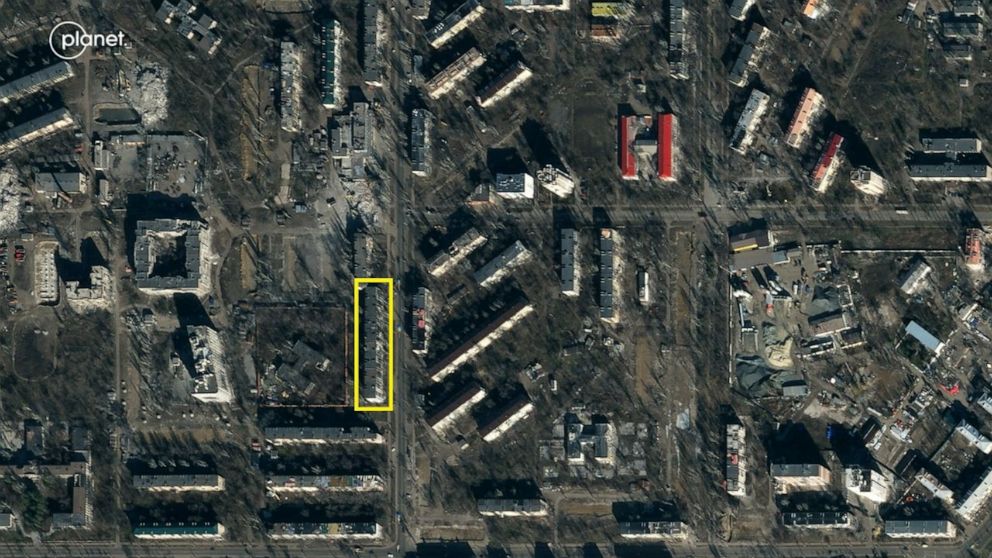


A year since Russia took control of the Ukrainian city of Mariupol, plans for reconstruction are under way but former residents aren't convinced.
The siege of Mariupol started the day of the Russian invasion of Ukraine and ended on May 20, 2022. The battle ended with the surrender of the last Ukrainian fighters at their final stronghold -- the Azovstal steel plant.
Katya Plechystova got a call on that day from an unknown number. It was her husband Oleg. For three months he had been defending their hometown while fighting for the Ukrainian army. They hadn’t spoken -- except for the very occasional text message -- since before the invasion.
“He said that they are leaving the plant, that this is just an evacuation through Russia and that they have guarantees that everything would be fine,” Katya says. That was the last time Katya spoke to Oleg. “There has been no information about his whereabouts for this whole year”
Dmytro Kozatsky was at Azovstal with Oleg. He struggles to talk about his experience. “In general, these three months passed like a whole separate life,” he told ABC News.
He says the worst moments were after airstrikes and having to call out to make sure everyone was still alive.
“Any time someone died during these strikes, that was probably the toughest,” he said.
Dmytro surrendered with Oleg on May 20 and was held in prison barracks with other Azovstal fighters before being exchanged in a prisoner swap in September.
More: The toll of war on Ukraine's soldiers returning from the front linesNeither Dmytro nor Katya can picture what the future looks like for Mariupol. Russia has used their efforts to rebuild the city for positive press, with President Vladimir Putin visiting a new apartment building as an example back in March.
But Dmytro is unimpressed.
“I would love for the city to be rebuilt and reformed, but it’s very difficult for me now to imagine how that could be done,” he said.
Russia put together plans for Mariupol's future as a Russian city almost immediately after the siege ended. In July 2022, local Russian-backed authorities signed into law a sweeping new bill outlining the reconstruction of Mariupol up to the year 2035.
The plan -- published in full by Russian media outlet The Village -- breaks down reconstruction by neighborhood, and projects a return to the city’s pre-war population by 2030. The Russian construction ministry announced in January that there were no plans for Azovstal to be repaired as the steel plant it once was. Instead, it is being envisioned as a vast business park with sprawling green spaces.
Satellite imagery indicates that the neighborhood next to it, which was severely damaged in the fighting, has been almost completely demolished in preparation for development.
Satellite Images: war ravaged Bakhmut then and nowTo Katya, even a Ukrainian-controlled Mariupol would not be enough for her to go back.
“I can’t imagine returning to the city because of all the pain and suffering I associate with it, because of all the pain my husband lived through in that city," she says. "I have this feeling inside of me that Mariupol was wiped out. There is nothing they could do to bring it back to me.”
Maria Vdovichenko, however, is one former resident who does dream of returning.
Having just graduated from high school, she lived through the siege of Mariupol as a civilian and when her apartment block came under fire in early March, her family moved to the basement for two long weeks.
“The shelling continued every day, every night. And every night we thought maybe we would die, maybe we wouldn’t survive because we were also without food, and without water,” she says. On March 17, her father decided they couldn’t wait any longer and they started the dangerous drive out of the city.
They passed through a Russian "filtration camp" where soldiers checked their documents for any sign of support for Ukraine before violently assaulting both Maria and her father. After 27 checkpoints, they finally arrived in Ukrainian-controlled territory.
Since then, Maria has been in Kyiv but she dreams of returning to Mariupol.
“I want to see all the streets, my drama theatre, my home. My home is destroyed in Mariupol, but I want to see it because I miss my city so much,” she says.
Maria wants to go to university to study something that would help her give back to her country. She says her family used to have big dreams before the war, but things have changed now, “We want to just live, in our home, our country, our land.”
Buildings in Maria’s neighborhood have slowly been demolished over the last year, though no new apartment blocks have been built in their place. In March of this year, a sign was put up on Maria’s old apartment block in Mariupol telling residents to leave the building by March 17 -- exactly one year since Maria’s family fled.
The building was demolished just three days later and the ground has now been prepared for a new building to take its place.
ABC News' Yulia Drozd contributed to this report.